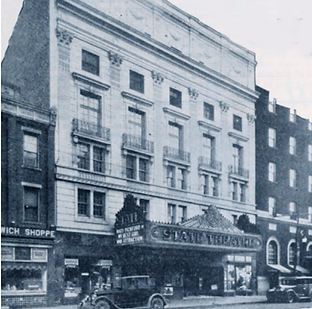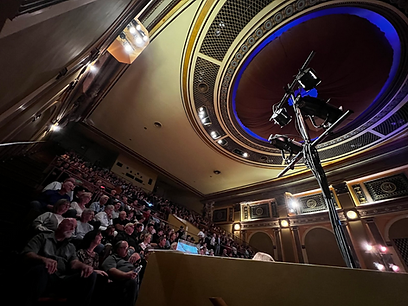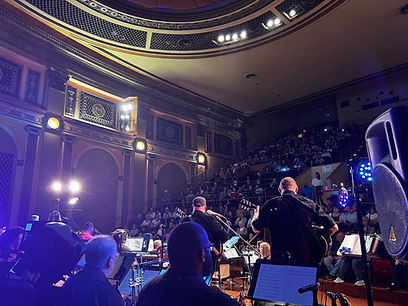The Story of the State Theater of Johnstown
Original Press Release: Click Here
If you have questions, please email us at:
questions@statetheaterfoundation.com
A Century of Dreams, Delays, and Determination
The State Theater opened in 1926 as Johnstown’s crown jewel: a lavish venue with over 1,400 seats, an orchestra pit, stunning interior design, and even a Prohibition-era speakeasy hidden two floors below street level. For half a century, the “million-dollar theater” created timeless memories; generations of Johnstown families walked through its doors, sat beneath its ornate chandeliered ceiling, and felt part of something larger than themselves.
After decades of movie magic and multiple iterations of its iconic marquee, the State closed in 1976; the lights went dark, but the building remained… aging, leaking, yet still standing as a reminder of Johnstown’s fruitful past.
The Age Of Commercial Destruction
In the late 70’s, after the town faced another crushing flood and the departure of the steel industry, the Theater struggled just like the town around it. The property changed hands, and was briefly owned by County Amusements LLC (state registration numbers 2150276 & 2533803). County Amusements briefly took ownership of multiple downtown theater properties prior to moving their movie theater operation to another part of town in Richland. Sadly, the State Theater was one of these properties that was closed by them and had a deed restriction placed on it in perpetuity. The restrictive covenant states that the property cannot be used as a “motion picture theater” without indication of an end date.
This deed restriction would only come to light decades later.
County Amusements then sold the property to Lee Hospital, which at the time was its own independent hospital entity. After putting this binding deed restriction on the property barring its future use as a movie theater, County Amusements sold the property to Lee Hospital for $1 dollar.
The Theater was then modified for use by the local hospital; the lower seating of the theater was covered with new flat flooring and the only original aspects of the theater left were 414 balcony seats and its original interior facade. This space was used as an auditorium for hospital functions.
Though the balcony, the original Italian travertine steps, and the original layout of the speakeasy were left intact, at some point in this transitory period certain parts of the theater’s historic offerings and assets were sold off by an owner. These offerings include the beautiful theater lobby chandeliers, which are still scattered throughout the town in different buildings.
For 40+ years the space was cared for and used for various meetings and training until the closure of Lee Hospital in 2006.
Guardianship and a Spark of Revival
In the years that followed, the Theater survived thanks to the quiet persistence of people who refused to let it be forgotten. One of them was Ben Policicchio, a staff architect for Conemaugh Memorial Medical Center. Long before redevelopment efforts took shape, he worked to keep the building intact, pushing for necessary maintenance so the theater would not be lost to time and neglect.
In 1992, the Johnstown Historic District was placed on the National Register of Historic Places; the State Theater was directly included and named in this designation document.
Video courtesy of Kaleidoscope; Cam-Ron Video Productions
February 2019
In 1992, the Johnstown Historic District was placed on the National Register of Historic Places; the State Theater was directly included and named in this designation document.
By 2019, momentum began to stir; there was new energy swirling around 336 Main Street. The Discover Downtown Johnstown Partnership (DDJP) hosted a pilot series of movies in the space, reintroducing the theater to the public. For many, it was their first time stepping inside the historic walls; for others, it was a homecoming. That pilot program proved what many already knew: the State Theater could once again be a catalyst, a destination, an anchor building for downtown Johnstown.
A Vision, and Its Roadblocks
Later that year, the City of Johnstown, in partnership with Conemaugh Memorial Medical Center, issued a Request for Proposals to formally revive the shuttered landmark. Eric and Amanda Reighard and their family formed the Johnstown State Theater Foundation; a board of local business owners and a team of young community activists and entrepreneurs. The Foundation “won” the RFP process with their innovative plan to secure ownership, leverage a $2 million RACP grant, pursue further grants with their grant writer, and engage Major Builders in a design-build renovation process to bring the State Theater back to its original design, layout, and glory.
The nonprofit planned to fix the roof and ensure no further water damage, restore the original theater layout, restore the original theater interior facade, bring a bright and bold new marquee to Main Street, renovate the upstairs “apartment” spaces into luxury Airbnb spaces, and transform the basement speakeasy space into a lively and formal jazz club to bring nightlife back to downtown Johnstown.
Even after the Foundation’s victory and its transformational vision for the space, transferring the theater to the Foundation stalled. Conemough (and its properties including Lee and the historic State Theater) was no longer owned by a nonprofit local hospital system, but a national health system based out of Tennessee called Duke Lifepoint Healthcare (DLP). Shortly after contacting the Foundation about the RFP win, DLP sold the Lee Hospital property and the adjoining State Theater to a holding company called Medical Properties Trust (MPT). This added complications to the hopeful property transfer.
To add another roadblock, instead of transferring the property directly to the 501(c)(3) nonprofit Foundation as the RFP outlined, DLP and its leadership insisted that a third-party government entity, such as the City of Johnstown or the Johnstown Redevelopment Authority (JRA), hold title to the building. This arrangement delayed progress, created legal and bureaucratic complications, and forced the Foundation to operate in a limbo where it could raise funds, host events via a month-to-month lease system with DLP/MPT, draw crowds of over 400 people for sold out shows, and even win multiple “Best of Johnstown” awards, but never fully secure and actually own the property it was trying to save.





Bringing the Theater Back to Life
From 2021 to 2022, the nonprofit persevered and the State Theater once again came alive through the planning of its young and innovative board and team members.
31 Days of Halloween filled October nights with horror films. 12 Days of Christmas brought Christmas concerts and holiday movie favorites; a showing of the local favorite “It’s a Wonderful Life” drew over 200 people to the Theater. A Tolkien Feast blended local Balance food with fantasy storytelling and got online reach as far as California. Spaghetti Western nights featuring local Gallina’s Pizza’s spaghetti and classic movies combined local businesses with timeless westerns. The Classic Movie Series and the Book-to-Movie Club showed classic films. The award-winning Classic Vinyl Concert Series brought 11 sold-out crowds inside the historic theater while playing the beloved songs of rock legends. More than 10,000 tickets were sold across multiple events. Guests came not only from Johnstown, but from 11 different states.
For the first time in decades, the State Theater was a destination.
The programming success drew attention far beyond Pennsylvania. In June 2022, IMAX Corporation executives and architects traveled from Toronto to inspect the historic theater, an extraordinary validation that an international, publicly-traded, and Fortune 500 company saw potential in downtown Johnstown.
IMAX was ready to bring its innovative IMAX technology to Johnstown, and erect an IMAX screen inside the State Theater, making it the only IMAX theater between Pittsburgh and Philadelphia. This would be a major tourist attraction and economic driver for downtown, for Johnstown, and for the entire surrounding region. First-run blockbusters would be shown inside the historic walls of the State Theater, garnering moviegoers from across the Commonwealth. A contract to bring IMAX to Johnstown was put in place.
Bureaucracy, Roadblocks, and Decay
As momentum grew, bureaucracy, corporate red tape, and a lack of power-backing put the State Theater in jeopardy. These issues included:
-
The City of Johnstown awarded $150,000 in ARPA funds to the nonprofit for roof repairs.
-
Even so, DLP does not permit roof construction or any maintenance and upkeep by the nonprofit without site ownership.
-
The City, in turn, froze the funds until ownership was resolved.
-
Thus, each time it rained, more water seeped into the historic theater. “Every time it rains, it rains inside,” became a constant, grim saying of theater team members.
Leadership changes at the hospital brought hope, first with CEO Bill Caldwell’s assurances, then with new CEO Rodney Reider’s public support. However, no final action or resolution on the transfer was brought forth.
Amid these challenges, the Johnstown Redevelopment Authority (JRA) stepped in. Working diligently alongside the Foundation, JRA created an interim ownership model that allowed the theater to move forward with fundraising, hosting events, and making critical remediations and maintenance. For the first time, it seemed like the balance of bureaucracy and creativity might tilt toward progress.
By March 2024, just as the nonprofit’s IMAX dream for Johnstown was coming to fruition, a title search, which was understood to have been conducted prior to the RFP creation, uncovered the aforementioned 1970s deed restriction which prohibited the property from being used as a “motion picture theater” in perpetuity. This is the very same deed restriction put in place by County Amusements LLC in the 1970s right before its sale to Lee Hospital for $1 dollar.
County Amusements (state registration numbers 2150276 & 2533803) had different members/owners throughout the years, but at the time of the finding of the deed restriction, the sole owner of the LLC is also the current owner of Richland Cinemas. The nonprofit brought the results of the title search to the owner in good faith but he rebuffed the nonprofit’s pleading to allow its one single IMAX screen to be placed inside the historic theater. The owner's reasoning was that the “share of pie” in town for movies was not big enough for even one more movie screen.
JRA even asked Cambria Amusement to acquiesce, reiterating the importance of the theater for the downtown and the entire region, but he persisted in enforcing the anachronistic deed restriction. Cambria Amusement’s enforcement of this decades-old deed restriction put in place by his father (the former owner of County Amusements) doomed IMAX’s arrival in Johnstown. The State Theater, according to the deed restriction, could not show IMAX movies because it could not be used as a “motion picture theater.”
The nonprofit must note that this deed restriction should have been discovered by the City and the property owners before the RFP for use of the building as a movie theater was originally issued.
Overnight, the hard work of the foundation and its IMAX dream for Johnstown was in jeopardy.
Then came the severe rain and flooding of August 2024; this severe flooding tore apart the interior facade, leaked onto crucial equipment, soaked the balcony seats and seeped all the way down to the basement. The nonprofit team worked diligently to try and remove water and mitigate damage, but ultimately ruled that the Theater was unusable for events going forward; without events, fundraising to save the State Theater stopped.
The nonprofit was still not the property owner, so it could not fix the roof and it could not oversee the cleanup of the Nationally-Registered Historic Site.
Without its unusual month-to-month lease in place for events, the nonprofit was locked out of the theater space.
Throughout the nonprofit’s theater revival efforts, the two main roadblocks to the Theater’s burgeoning vision have been a decades-old deed restriction stifling the process of bringing a Fortune 500 company to Johnstown, and the continued deterioration of the historic theater due to lack of upkeep, deferred maintenance, and the slow transfer of the property.
Negotiations and an Ending
In early 2025 it was clear that due to the deed restriction, putting IMAX in the State Theater was no longer feasible. The Foundation was still positive and aimed now to create a multi-use arts hub: a 1200-seat performance space for a variety of events such as concerts, recitals, plays, musicals, graduations, ballets, comedy acts, lectures, and weddings; an underground cabaret/jazz club in the basement to bring nightlife to downtown Johnstown; upstairs boutique Airbnb suites, classrooms, recording studios, and 35mm film archives… but because of the rain damage, at that point the costs of remediation had grown exponentially.
Additionally, part of the suggested transfer agreement included restrictive measures like who could advertise at the Theater, what sort of events could happen at the Theater, and requested that the nonprofit pay DLP $5,000 in lawyer fees.
By the summer of 2025, the theater continued to deteriorate; the Foundation was scared to take on a building that might no longer be fixable. We worried we would ultimately be stuck with the demolition of a Nationally-Registered Historic Site, and this would make the demolition look like it was the nonprofit’s fault.
To ease these prudent worries and because of the horrific deterioration of the State Theater, the Foundation requested that Conemaugh/DLP donate $1.5 million (in three different $500k segments) to the nonprofit to help kickstart the project upon transfer of the property. The three segments were:
-
$500k for utilities and operating costs, because the nonprofit foresaw a struggle to cover these costs after losing two years of events and fundraising due to water damage
-
The transfer of a dormant and unused $500,000 RACP grant from 2019 owned by Conemaugh and designated for “Lee Hospital Upgrades”
-
Per the publicly-available grant award:“This initial effort by Conemaugh will involve the interior renovation of a significant portion of the Lee Campus building located at 320 Main Street in Johnstown. The initial phase will be to renovate, update, reconfigure and modernize selected portion(s) of the building so that, when a use for the space is definitively identified, fit-out for that use can occur on an expedited basis. It is Conemaugh's intent to eventually use the full building to accommodate future growth at Memorial Medical and the Health System as a whole. RACP funds will be used for renovation of selected portions of the Lee Campus building. These renovations will likely include demolition of existing interiors, reconfiguring and installation of electric and telecommunication lines, plumbing and HVAC, and basic build-out of the space.”
-
The nonprofit saw this request as warranted due to the fact that the Theater was merged into Lee Hospital, and so an unused grant designated for Lee Hospital could be used to separate the two properties and conduct the same sort of activities mentioned in the description above in a property directly adjacent to Lee Hospital.
-
-
$500k in required RACP match to pair with the requested grant above.
Although Conemaugh/DLP initially indicated that they were "considering our request for a significant donation" to the Foundation, on August 27, 2025 DLP responded they were "unwilling to make any financial contribution to the Foundation with respect to the Theater Building."
With deferred maintenance left unaddressed, costs mounting, and an already-restrictive agreement on the table, the Foundation made an extremely saddening and difficult decision in September of 2025: it would no longer move forward with the project.
The historic edifice's fate remains with Conemaugh Hospital and its parent company, Duke LifePoint Healthcare.
What Was Lost, and What Remains
This story is about more than a building. The State Theater Foundation didn’t just lose a theater; it lost what it symbolized to Johnstown – a chance to change the town’s story; to prove that a new industry, a new opportunity could take root; to bring big business to Johnstown; to revitalize the town through the arts; and to bring a true, anchor and tourist attraction to downtown.
When powerful institutions and red tape blocked real progress, it reinforced the narrative that nothing good can survive in Johnstown.
But here’s the truth:
-
We were right to try. Most communities never even attempt something bold. We did, and we proved it was possible. We tried our very hardest.
-
We ran into an old Johnstown pattern. Outside forces and entrenched power networks have long kept things status quo here. The fact that our vision didn’t thrive in that system doesn’t make it wrong — it makes it necessary.
-
Hopelessness is only a phase. What we built — credibility, connections, proof of capacity shown through the Classic Vinyl Series, classic movies, and a variety of events — remains fuel for what comes next for future groups to do good things downtown.
-
The spirit lives on. The theater may be closed for now, but the mission of arts, community, and shared space can take new forms by other organizations. Examples of these are the The Bottleworks, Made in Johnstown space, the Grande Halle on Broad Street, the Gallery on Gazebo, and many other efforts led by the good people of our community.
-
Permission to grieve. We can acknowledge the loss, and then let that pain harden into clarity. Because the system will always resist change, but people who try anyway are the only reason Johnstown has a shot at a future.
While we are saddened that the Johnstown State Theater Foundation will not be moving forward, and that the fate of this historic landmark remains in the hands of the hospital that has failed to maintain its upkeep, we are deeply grateful for the journey. We are thankful for the opportunity to bring the theater back to life, for the many wonderful events we were able to hold, for the memories we made with our team and for our townspeople, for our patrons and supporters who believed in us, our partnerships with extraordinary organizations and local businesses, and for the countless incredible people we met along the way.
We hope and pray that somehow, someway the State Theater can still be saved.


